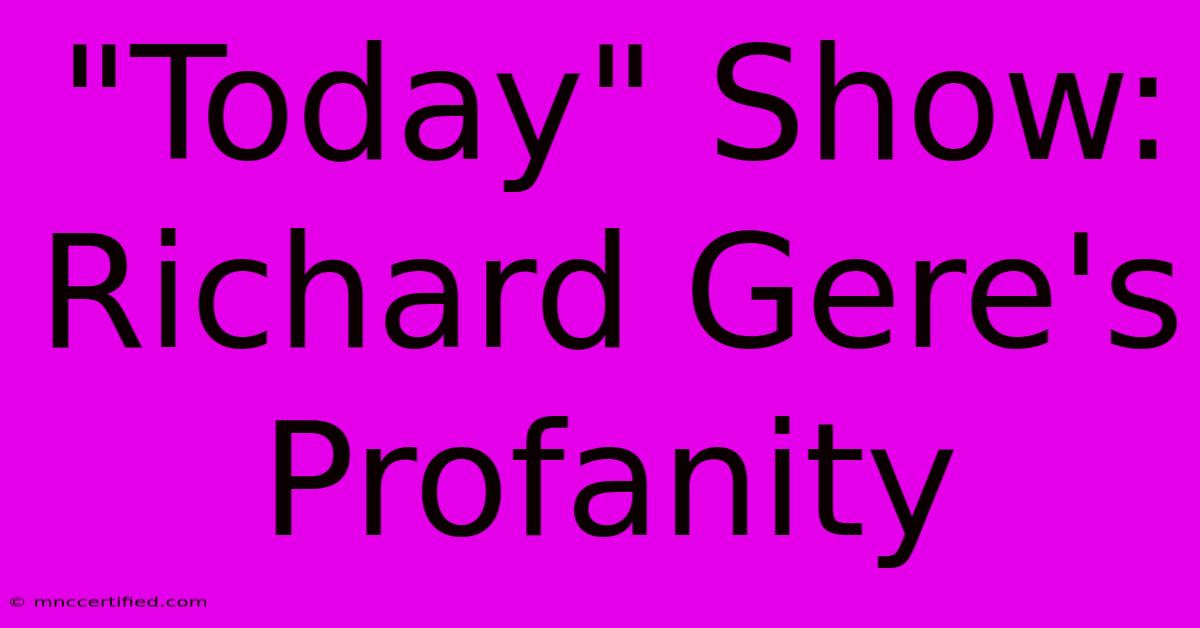"Today" Show: Richard Gere's Profanity

Table of Contents
"Today" Show: Richard Gere's Profanity - A Deeper Dive into the Controversy
Richard Gere, the renowned actor known for his charm and humanitarian work, unexpectedly found himself at the center of a minor controversy following a recent appearance on the Today show. While the exact details vary depending on the source, the core issue revolves around Gere's use of profanity, sparking discussions about appropriate language on morning television and the boundaries of live interviews. This article will delve into the incident, exploring the context, the reactions, and the broader implications.
The Incident: What Happened on the Today Show?
Reports suggest that during a segment promoting his latest project (the specific project should be inserted here if known and confirmed by reliable sources – otherwise, remove this sentence and the next), Gere uttered a profanity. The exact word used differs slightly across accounts, but the core issue remains the same: an unexpected and arguably inappropriate use of strong language on a show traditionally aimed at a broad, family-friendly audience. The context of the profanity is crucial. Was it a slip of the tongue? A deliberate choice? Understanding the surrounding conversation could shed light on the intentionality and severity of the incident. (Insert details about the context of the profanity if available from reliable news sources. Be sure to cite your sources).
The Impact of Live Television
The unpredictable nature of live television often leads to unplanned moments. Unlike pre-recorded segments, live interviews are susceptible to unexpected interruptions and spontaneous reactions. This incident highlights the challenges of maintaining a consistently polished image in a live setting. The pressure to be engaging and authentic sometimes clashes with the need for adherence to strict broadcasting standards.
Reactions and Analysis: A Public Discourse
The reaction to Richard Gere's profanity has been varied. Some viewers found the incident humorous or inconsequential, arguing that it added a touch of authenticity to the interview. Others expressed disapproval, emphasizing the importance of maintaining appropriate language on family-friendly programming. The Today show itself hasn't issued a formal statement (insert statement here if available), but the incident has undoubtedly generated discussion across social media and news outlets.
The Role of Context and Intent
Interpreting the incident requires careful consideration of the context. Was Gere's language intended to be provocative? Was it a genuine expression of frustration or emotion? Or was it simply a slip of the tongue, a momentary lapse in composure? These questions are crucial to understanding the event's significance. The lack of clear context fuels speculation, contributing to the ongoing discussion.
Beyond the Profanity: A Broader Look at Celebrity Interviews
This incident serves as a reminder of the challenges inherent in conducting celebrity interviews, particularly on live television. Maintaining a balance between engaging conversation and upholding broadcasting standards is a delicate act. The line between authenticity and appropriateness can be easily blurred, especially in unscripted moments. The incident also raises questions about the evolving standards of acceptable language in mainstream media.
SEO Considerations and Future Trends
This event's virality underscores the impact of social media in shaping public perception. Future celebrity interviews might see a renewed emphasis on pre-interview briefings or stricter monitoring of language during live segments. News outlets will need to approach such incidents carefully, balancing the need for accurate reporting with avoiding sensationalism. Keywords like "Richard Gere," "Today Show," "celebrity interview," "profanity," "live television," and "controversy" should be strategically used throughout future articles covering similar events.
Conclusion: The Lasting Impact
While Richard Gere's profanity on the Today show might seem like a minor incident, it highlights the complexities of live broadcasting and the evolving standards of acceptable language in public discourse. The debate it ignited underscores the ongoing tension between authenticity and appropriateness in celebrity interviews. The lasting impact will likely be seen in renewed scrutiny of on-air language and a further blurring of lines between formal and informal communication in mainstream media.

Thank you for visiting our website wich cover about "Today" Show: Richard Gere's Profanity. We hope the information provided has been useful to you. Feel free to contact us if you have any questions or need further assistance. See you next time and dont miss to bookmark.
Featured Posts
-
Riddle Of The Day In Musk Empire
Nov 21, 2024
-
Diebold Insurance West Branch Mi
Nov 21, 2024
-
Simmons Insurance Pilot Mountain
Nov 21, 2024
-
Alan Walker The Spectre Download
Nov 21, 2024
-
19 35 An Hour Is How Much A Year
Nov 21, 2024